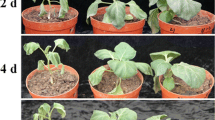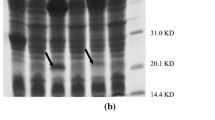Abstract
Antifreeze proteins (AFPs) enable organisms to survive under cold conditions, and have great potential in improving cold tolerance of cold-sensitive plants. In order to determine whether expression of the carrot 36 kD antifreeze protein gene confers improved cold-resistant properties to plant tissues, we tried to obtain transgenic tobacco plants which expressed the antifreeze protein. Cold, salt, and drought induced promoter Prd29A was cloned using PCR from Arabidopsis. Two plant expression vectors based on pBI121 were constructed with CaMV35S:AFP and Prd29A:AFP. Tobacco plantlets were transformed by Agrobacterium-medicated transformation. PCR and Southern blotting demonstrated that the carrot 36 kD afp gene was successfully integrated into the genomes of transformed plantlets. The expression of the afp gene in transgenic plants led to improved tolerance to cold stress. However, the use of the strong constitutive 35S cauliflower mosaic virus (CaMV) promoter to drive expression of afp also resulted in growth retardation under normal growing conditions. In contrast, the expression of afp driven by the stress-inducible Prd29A promoter from Arabidopsis gave rise to minimal effects on plant growth while providing an increased tolerance to cold stress condition (2°C). The results demonstrated the prospect of using Prd29A-AFP transgenic plants in cold-stressed conditions that will in turn benefit agriculture.
Similar content being viewed by others
References
Burke M J, Gusta L V, Quamme H A, Weiser C J, Li P H. 1976. Freezing and injury in plants. Annual Review of Plant Physiology. 27: 507–528
Clark M S, Gu H Y, Qu L J. 1998. Plant Molecular Biology—A Laboratory Manual (Chinese version). Beijing: Higher Education Press
Cui Q. 1995. Plant physiology and Biochemistry—A Laboratory Manual. Beijing: Chinese Agricultural Press
Davies P L, Sykes B D. 1997. Antifreeze proteins. Current Opinion in Structural Biology. 7: 828
Dityatkin S Y, Lisovskaya K V, Panzhava N N, Iliashenko B N. 1972. Frozen-thawed bacteria as recipients of isolated coliphage DNA. Biochem Biophys Acta. 281: 319–323
Griffith M, Ewart K V. 1995. Antifreeze proteins and their potential use in frozen foods. Biotechnology Advances. 13: 375–402
Griffith M, Hon W C, Chong P, Yang D S C. 1994. Extraction and isolation of antifreeze proteins from winter rye (Secale cereale L.) leaves. Plant Physiology. 104: 971–980
Griffith M, Yaish M W F. 2004. Antifreeze proteins in overwintering plants: a tale of two activities. Trends in Plant Science. 9(8): 399–406
Holsters M, de Waele D, Depicker A, Messens E, van Montagu M, Schell J. 1978. Transfection and transformation of Agrobacterium tumefaciens. Mol Gen Genet. 163: 181–187
Horsch R B, Fry J, Hofmann N, Neidermeyer J, Rogers S G, Fraley R T. 1998. Leaf disc transformation. In: Plant molecular Biology Manual (Gelvin S B, Schilperoot R A eds). Dordrecht: Kluwer
Lee J T, Prasad V, Yabg P T, Wu J F, David Ho T H, Charng Y Y, Chan M T. 2003. Expreesion of Arabidopsis CBF1 regulated by an ABA/stress inducible promoter in transgenic tomato confers stress tolerance without affecting yield. Plant, Cell and Environment. 26: 1 181–1 190
Saiki R K, Gelfand D H, Stoffel S, Scharf S J, Higuchi R, Horn G T, Mullis K B, Erlich H A. 1988. Primer-directed enzymatic amplification of DNA with a thermostable DNA polymerase. Science. 239: 487–491
Sambrook J, Fritsch E F, Maniatis T. 1989. Molecular Cloning: A Laboratory Manual. New York: Cold Spring Harbor Laboratory Press
Steponkus P L, Webb M S. 1992. Freeze-induced dehydration and membrane destabilization in plants. In: Water and Life (Somero et al. eds). Berlin: Springer-Verlag. 338–362
Urrutia M, Duman J G, Knight C A. 1992. Plant thermal hysteresis proteins. Biochimica et Biophysica Acta. 1 121: 199–206
Wallis J G, Wang H, Guerra D J. 1997. Expression of a synthetic antifreeze protein in potato reduces electrolyte release at freezing temperatures. Plant Molecular Biology. 35: 323–330
Worrall D, Elias L, Ashford D, Smallwood M, Sidebottom C, Lillford P, Telford J, Holt C, Bowles D. 1998. A carrot leucine-rich-repeat protein that inhibits ice recrystallization. Science. 282: 115–117
Yeh Y, Feeney R E. 1996. Antifreeze proteins: Structures and mechanisms of function. Chemical Reviews. 96: 601
Author information
Authors and Affiliations
Corresponding author
Additional information
[Supported by the National Natural Science Foundation of China (Grant No. 30271067), Fok Ying Tung Education Foundation (Grant No. 71030), Key Teachers Foundation of the Educational Ministry of China, and Graduate Training Grant of Beijing Forestry University (Grant No. 03SW003)]
Rights and permissions
About this article
Cite this article
Xu, Wl., Liu, Mq., Shen, X. et al. Expression of a carrot 36 kD antifreeze protein gene improves cold stress tolerance in transgenic tobacco. For. Stud. China 7, 11–15 (2005). https://doi.org/10.1007/s11632-005-0039-3
Received:
Accepted:
Issue Date:
DOI: https://doi.org/10.1007/s11632-005-0039-3




